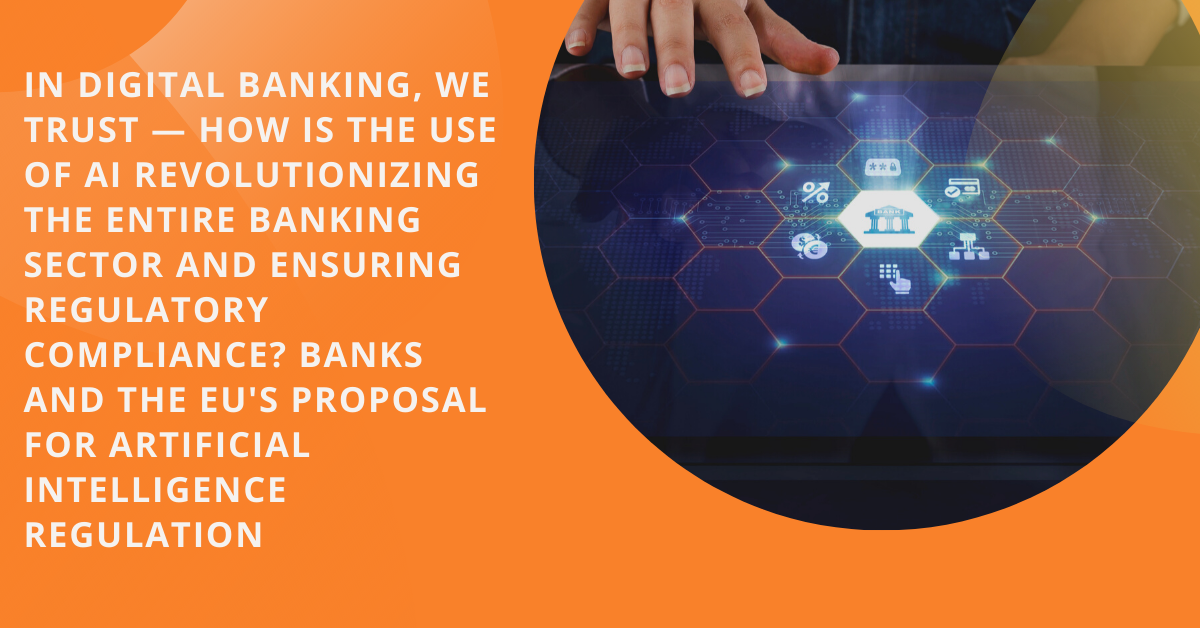
The rapid growth of the AI sector is a revolution in the making, as numerous industries will be completely reshaped by the use of new technologies within the next few years. In general, banking and the financial sector were always synonymous with tradition, but with the progressing digitalization financial institutions began to quickly embrace innovative solutions to cater to the dynamic needs of the modern population. As digital banks, such as Revolut and Monzo, are gaining enormous popularity and attracting new customers, traditional banks are forced to adapt to the changing times and make their services as accessible as possible to keep their market shares intact.
According to Statista, the global business value derived from artificial intelligence (AI) in the banking industry will go from 78 billion U.S. dollars in 2020 to around 300 billion U.S. dollars in 2030. The opportunities offered by AI can transform almost every aspect of modern banking, so it is not surprising that 80% of banks are aware of the potential benefits AI offers and make the implementation of AI-powered solutions the foundation of their growth strategy for the next years. How is AI revolutionizing the entire banking industry?
Main use cases of AI in banking
1. Improved customer experience and streamlined Know-Your-Customer services
Know-Your-Customer (KYC) is a mandatory process of identity verification all banks must perform for their customers to prevent identity fraud and keep their services as secure as possible. The use of AI can streamline the identification process by introducing digital verification methods, for example, facial recognition. Since customers often have to prove their identity with additional documents, bank employees have to verify an immense number of documents and automated document uploading can ease their workload. The digitalization of the KYC process allows simplifying the verification process as much as possible, improving both the customer experience and the work efficiency of bank employees. The implementation of AI solutions can also help banks address the needs of their customers better based on insights derived from pasta data.
2. Automated Anti-Money Laundering (AML) mechanisms
Money laundering is a big concern for banks and the use of AI helps banks with transaction monitoring, especially when it comes to legit transactions flagged as potentially suspicious — false positives. Such transactions are expensive to process and cause major inconvenience to customers, who cannot finalize their transactions. Given that AI simplifies the process of assessing the risk connected to every transaction, it can significantly reduce the costs of transaction monitoring and AML compliance audits.
3. Fraud detection
Thanks to the extensive monitoring of customer behavior and deep data analysis, AI allows banks to predict typical customer behavior and therefore, quickly identify fraud attempts. The accuracy of such mechanisms only grows with the number of available datasets and in consequence, the number of false positives decreases. Moreover, with the introduction of biometric identification, not only does the Know-Your-Customer process become more convenient for customers, but the banking system itself is more protected against identity fraud.
4. Risk assessment
The entire financial sector depends on the right assessment of risk, which is always involved when banks lend money. Before giving any loans, banks have to assess the likelihood of a loss if a borrower fails to clear his debt. Individuals with a questionable credit history are denied loans, but there are numerous factors that impact one’s credibility. AI algorithms are able to assess one’s credit score more accurately than humans because they are built to find patterns in large volumes of data. Banks can also use AI for market trading to gain price points and market insights that can help them make more informed investment decisions.
5. Service optimization
Since the automation and fast-processing of data help to find patterns in customer data, it takes personalization to the next level, providing customers with the best recommendations based on their economic conditions and past operations. Thanks to data analysis, banks can determine how to boost their efficiency, especially in the case of routing customer calls.
6. Regulatory compliance
Within the financial sector regulatory compliance is extremely important, but because of the fast-changing and ever-growing lists of regulations, complying with the law can be challenging. Costs associated with compliance do not drive revenue, but hefty fines for non-compliance motivated banks to automate the work of their compliance team in order to determine the priority and order in which certain regulations should be implemented. AI solutions designed to scan thousands of pages help bank employees to stay up to date with the latest regulations issued by governments. It is especially important for international banks, which operate in numerous territories, are therefore are expected to ensure different levels of regulatory compliance.
AI-powered banking in DACH countries
DACH countries started to embrace digital solutions as they are beginning to increasingly use AI and data analytics in their everyday operations. Despite the global pandemics and uncertainty on the market, banks are showing resilience, as they managed to avoid significant loan defaults. The health crisis accelerated the rate of digitalization, as many customers turned to digital channels to manage their transactions. As much as 40% of Swiss banks reported strongly accelerated digital growth in their structures, and 25% of them stated that structural changes in Swiss banking are driven by technology innovation. Over the next 6-12 months, top priorities for Swiss banks will be cybersecurity, cost reduction, and process optimization, and industrialization, so AI solutions are likely to only gain importance in the next years. The AI is revolutionizing the entire region, as market leaders, such as axeed AG, introduce AI-based sales solutions for banking and wealth management across all DACH countries.
Some of the most common concerns regarding AI center around potential data security problems and the lack of human oversight over the technology. The European Union drafted a proposal for AI regulations and its articles 13, 14, and 15 focus on Transparency and provision of information to users, human oversight, and accuracy, robustness, and cybersecurity. EU organizations, which make use of high-risk AI systems, are obliged to ensure data transparency and human oversight to minimize “the risks to health, safety or fundamental rights that may emerge when a high-risk AI system”. Additionally, they are legally bound to create a secure cyber architecture, which is resilient to access attempts by unauthorized third parties. The entire proposal lays down the foundations of AI regulation, which is meant to encourage innovation, but not at the cost of data privacy and cybersecurity.
In the era of a data-driven economy, AI solutions may be the answer to most of the banking sector’s problems, as they are designed to maximize efficiency, cut costs, and ensure regulatory compliance. With the accelerated digitalization, banks are beginning to embrace AI with open arms to keep their clients, profit margins, and market shares in the times when customer convenience drives the popularity of digital banks, and data is the new oil.
Sources:
- https://isg-one.com/docs/default-source/default-document-library/banking-industry-ecosystem(eng)-2020.pdf?sfvrsn=1cec431_2
- https://www.it-daily.net/it-management/digitalisierung/27965-immer-mehr-banken-nutzen-ki-im-breiteneinsatz
- https://www.businessinsider.com/ai-in-banking-report
- https://www2.deloitte.com/us/en/pages/consulting/articles/ai-in-banking.html
- https://zephyrnet.com/digital-banking-switzerlands-postfinance-partners-swissquote-to-launch-virtual-bank-app-yuh-will-be-available-may-11/
- https://sanctionscanner.com/blog/artificial-intelligence-and-anti-money-laundering-17
- https://www.deltecbank.com/2020/06/15/applying-ai-to-risk-management-in-banking-and-finance-whats-the-latest/?locale=en
- https://emerj.com/ai-sector-overviews/artificial-intelligence-compliance-banking/
- https://www.geneve-finance.ch/file.cfm?cmsfile=/common/documents/library/banking-barometer-2021-en.pdf&contentID=1279
- https://www.axeed.ch/news/axeed-ag-expands-ai-based-sales-solution-move
- https://eur-lex.europa.eu/legal-content/ES/TXT/?uri=COM:2021:206:FIN





